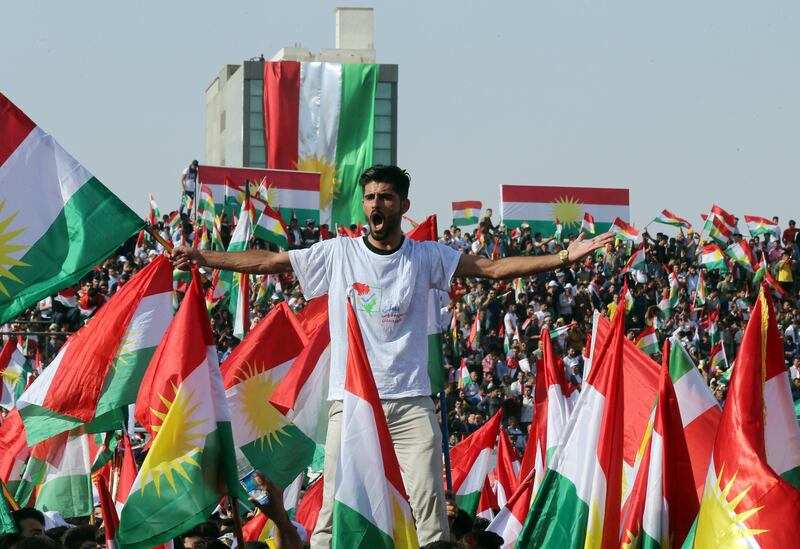The Iraqi Kurdish cities of Erbil and Duhok were ablaze with Kurdish flags and reverberating to the sound of Kurdish music and honking cars on Sunday, the day before a controversial independence referendum was due to take place.
But it was a different story in the more ethnically diverse areas taking part in Monday's vote, including in the city of Kirkuk where many people were keeping their heads down and preparing for the potential outbreak of violence between Iraqi militias and Kurdish forces.
This is not the first time Iraq’s Kurds have called for independence from Baghdad. But the timing of the current call is unique, coming when Kurdish forces have control of a number of disputed areas coveted by both Baghdad and the Kurdistan Regional Government, including oil-rich Kirkuk.
Miqdad Faidhulla, a Kurdish member of the Iraqi Islamic Party in Kirkuk, said tensions between the KRG's Peshmerga forces in the city and Iraqi prime minister Haider Al Abadi's government had reached their peak.
“It’s reaching a military problem — imagine two motivated armed groups fighting over one city,” he said, referring to the Peshmerga and the Popular Mobilisation Forces (PMF), an Iranian-backed umbrella group of mainly Shiite militias sanctioned by Baghdad.
_______________
Read more on the referendum:
Analysis: Kurdish independence vote a smokescreen for Barzani's domestic political woes
[ Iraqi Kurdistan independence referendum: Seven key points ]
[ Barzani says 'too late' to postpone Iraqi Kurdish referendum ]
_______________
Kirkuk's typically busy shopping streets were quieter than usual on Thursday when The National visited as residents stayed indoors, having already stocked up on food, with some even sending family members to other cities or countries.
“If the referendum is used as a way to establish complete Kurdish political control over the city there is likely to be a significant backlash from Turkmen and Arab residents,” said Michael Stephens of the Royal United Services Institute think tank in London.
One young Arab man in Kirkuk predicted violence.
“If the two sides continue like this there will be conflict,” he said, referring to the KRG and Baghdad.
But although some Kurds are calling for the vote to be delayed, many more are readying themselves to head to the polls and vote 'Yes' on Monday, believing the referendum could be the beginning of the end of modern-day Iraq.
“We have been waiting for the right moment for one hundred years and it never came,” said Osamah Golpy, 32, an Erbil-based editor at the Kurdish news site Rudaw English.
“I think time is not right unless you make it right."
Golpy is from the Iraqi Kurdish city of Halabja where one of Saddam Hussein’s most notorious assaults on the Kurds took place in 1988 — a five-hour chemical attack that killed some 5,000 civilians.
The son of a veteran Peshmerga fighter and a former refugee himself, Golpy believes an independent Kurdistan would provide him and his people with security.
“The benefit of leaving Iraq [will be] that for the first time in my life I feel safe, I feel like there is a Kurdish army, a Kurdish state that protects my life from another genocide,” said Golpy.
“I think we, like the Jews, have come to the conclusion that only a state by the Kurdish people and for the Kurdish people can protect us.”
Despite Halabja’s troubled past, some of its younger residents are choosing to vote "No" as a result of their disillusionment with the autonomous region's ruling Kurdistan Democratic Party (KDP). Golpy’s younger brother, Mariwan, has a BA in sociology but the dire financial situation in the region has seen him resort to driving a taxi for a living.
“He thinks voting ‘No’ is the right revenge on Kurdish leaders who promised young people like him a good life … I see many young people like my brother in Halabja,” said Golpy.
North of Halabja in the PUK-stronghold of Sulaymaniyah, visible signs of support for the referendum were hard to find, according to one resident.
One of the city's main roads was partly peppered with flags, said Rawand Saeed, 26, but “the rest of the bazaar and the city are quite normal”.
The computer engineering graduate was adamant that most of the city would vote "Yes" to independence on Monday but said political disputes between the different Kurdish factions had dampened enthusiasm for the "Yes" campaign.
“If you talk to people, they are all for independence, but when you walk into the city you can’t visibly see that there’s a thing called referendum,” he added.
Outside of Iraq, voting was already underway for members of the Kurdish diaspora who could begin casting online votes on Saturday.
Film director Beri Shalmashi, 33, voted "Yes" from her family home in the Netherlands capital, Amsterdam, where she has lived for 30 years.
“To see a part of Kurdistan stubborn enough to be able to set up a referendum is a big deal,” said Shalmashi.
“I truly felt part of history, part of a point of no return for Kurdistan and for the region.”
“For many of us (in the diaspora) the connection with Kurdistan remains very strong … no matter how long and how far away, the dream of an independent state remains a shared dream.”





